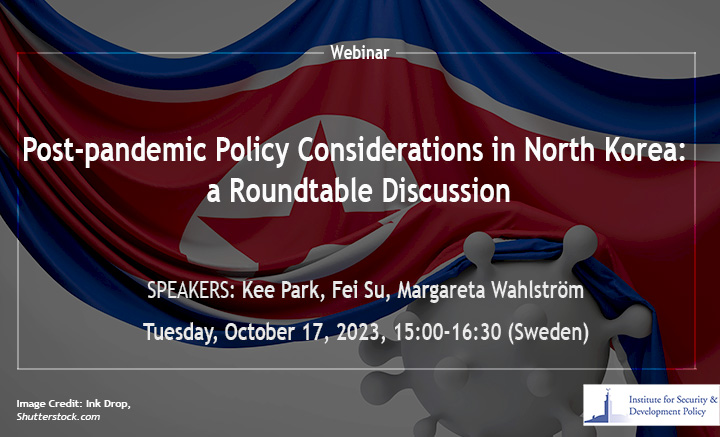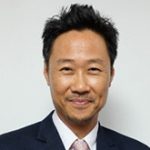Post-pandemic Policy Considerations in North Korea: a Roundtable Discussion

Did you miss this webinar? The full recording is available on ISDP’s YouTube channel.
In January 2020, the Democratic People’s Republic of Korea (DPRK or North Korea) was the first country in the world to shut its borders in response to the covid-19 outbreak, suspending international trade and travel. Now, after almost four years of pandemic restrictions, North Korea is showing signs of reopening. Following recent visits to Pyongyang by Chinese and Russian diplomats, DPRK citizens who have resided overseas are now being called upon to make their re-entry into the country.
Still, the pandemic era will have a lasting impact. The loss of cross-border mobility along the previously porous DPRK-China border has had far-reaching effects on domestic livelihoods. Both North Korean state media and the international community indicate that food insecurity in the country has been made acute by the suspension of trade with China, a significant source of food and medicine. The government has implemented a stern lockdown on information, exacerbating the pre-existing lack of data and making it more challenging to forecast the country’s needs. At the same time, the Ukraine war has spurred a shift in the dynamic between Russia and the DPRK, and as pandemic restrictions are lifted, in-person meetings may consolidate this momentum. Kim Jong Un recently went on a multi-day tour of space and military facilities in eastern Russia, marking Kim’s first travel abroad since 2019.
Following a highly anticipated summit with Vladimir Putin, the two leaders agreed to boost bilateral cooperation, and Putin accepted an invitation to visit Pyongyang. The developments indicate that North Korea is moving on from the Covid-19 era. The question is, in what direction?
The ISDP Korea Project is honored to organize this roundtable discussion to explore cross-cutting issues in post-pandemic North Korea. The discussion will depart from what is known about the current situation in the DPRK and discuss probable future developments related to the implications of the regime’s recent initiatives, exploring the nexus between security and development issues. What can or should the international community do to engage with Pyongyang on security and humanitarian issues?
Questions
- What are the implications of the fortified China-North Korea border on regional trade and the domestic humanitarian situation?
- How does the lack of reliable data and the long-time absence of foreign diplomats/humanitarian workers in the country impact the preconditions for international efforts of aid and diplomacy going forward?
- What are the risks of an epidemic resurgence of COVID-19 in North Korea?
- What possible role might China and Russia play in North Korea’s post-pandemic policy considerations? How may this impact the UNSC sanctions regime?
- What are the prospects of the international community’s positive engagement with North Korea in diplomacy and humanitarian aid? What possible role can Swedish and other foreign NGOs play, and what opportunities are there for IGO efforts?
- What direction do you anticipate Pyongyang will pursue in diplomatic, security, agricultural and economic policy on a 1/5/10 year horizon?
Panelists:
 Margareta Wahlström is the former president of the Swedish Red Cross and former Special Representative of the UN Secretary-General for Disaster Risk Reduction. She has many years of experience working at the United Nations, the International Federation of Red Cross, and Red Crescent Societies, as well as in private sector disaster relief operations. Ms. Wahlström has accumulated a wide range of experience spanning from sustainable development to emergency management.
Margareta Wahlström is the former president of the Swedish Red Cross and former Special Representative of the UN Secretary-General for Disaster Risk Reduction. She has many years of experience working at the United Nations, the International Federation of Red Cross, and Red Crescent Societies, as well as in private sector disaster relief operations. Ms. Wahlström has accumulated a wide range of experience spanning from sustainable development to emergency management.
 Dr. Kee B. Park (MD) is the Director of the Korea Health Policy Project and the Director of Policy and Advocacy at the Program in Global Surgery and Social Change at Harvard medical School. Dr Park has much experience with public health in the DPRK, having served as the Director of the North Korea Program at the Korean American Medical Association between 2011 and 2021. Dr Park is also a consultant for the World Health Organization and serves on the WHO Expert Advisory Panel on Surgical Care and Anesthesia.
Dr. Kee B. Park (MD) is the Director of the Korea Health Policy Project and the Director of Policy and Advocacy at the Program in Global Surgery and Social Change at Harvard medical School. Dr Park has much experience with public health in the DPRK, having served as the Director of the North Korea Program at the Korean American Medical Association between 2011 and 2021. Dr Park is also a consultant for the World Health Organization and serves on the WHO Expert Advisory Panel on Surgical Care and Anesthesia.
 Fei Su is a Researcher at the China and Asia Security Program at Stockholm International Peace Research Institute (SIPRI). Ms Su’s fields of expertise include security issues in North Korea and the broader East Asia region, including China’s foreign and security policy, cyber- and maritime security. She holds an MA in Public Administration from Graduate School of Public Administration at Seoul National University.
Fei Su is a Researcher at the China and Asia Security Program at Stockholm International Peace Research Institute (SIPRI). Ms Su’s fields of expertise include security issues in North Korea and the broader East Asia region, including China’s foreign and security policy, cyber- and maritime security. She holds an MA in Public Administration from Graduate School of Public Administration at Seoul National University.
The speakers will be introduced by Frida Lampinen, Junior Research Fellow working with Korean Peninsula issues at ISDP’s Asia Program.